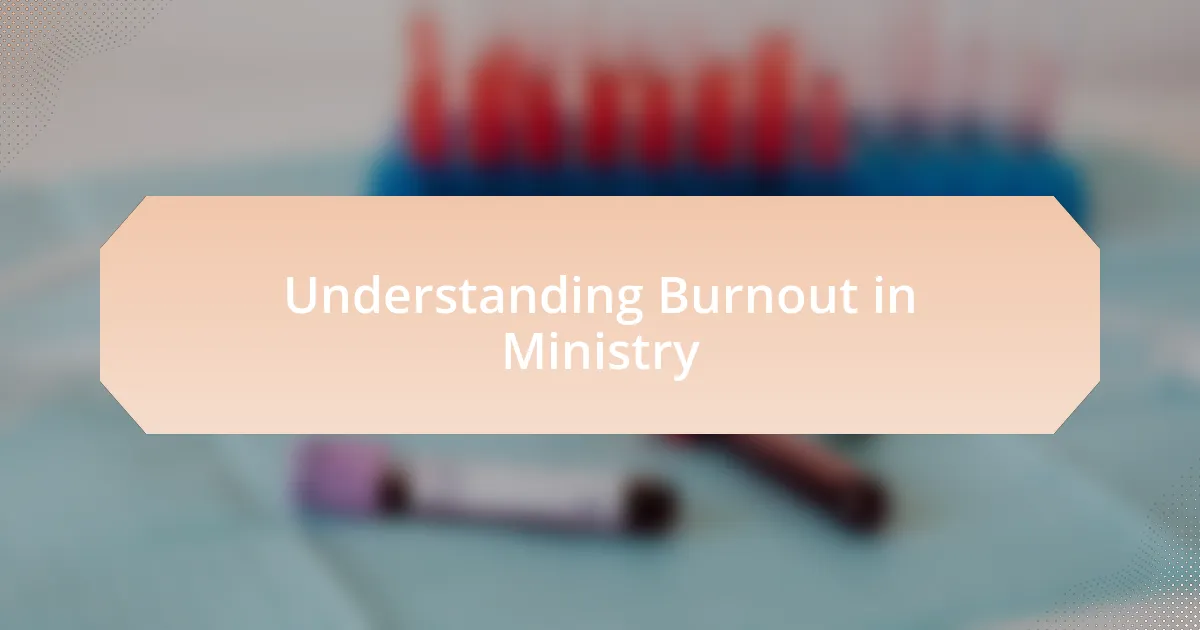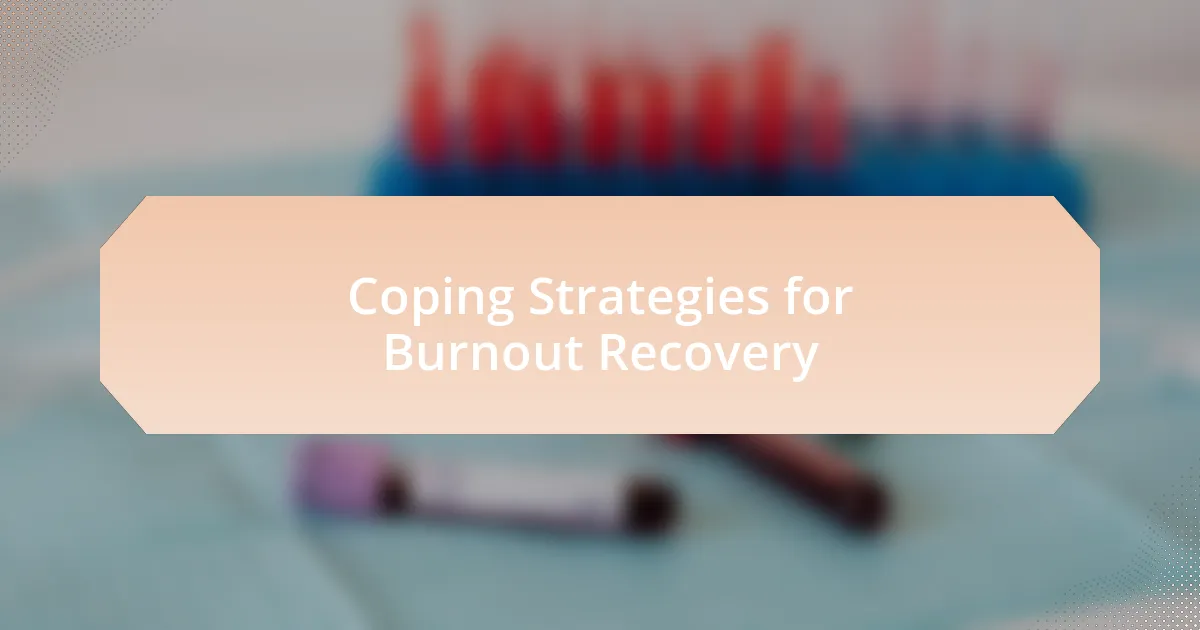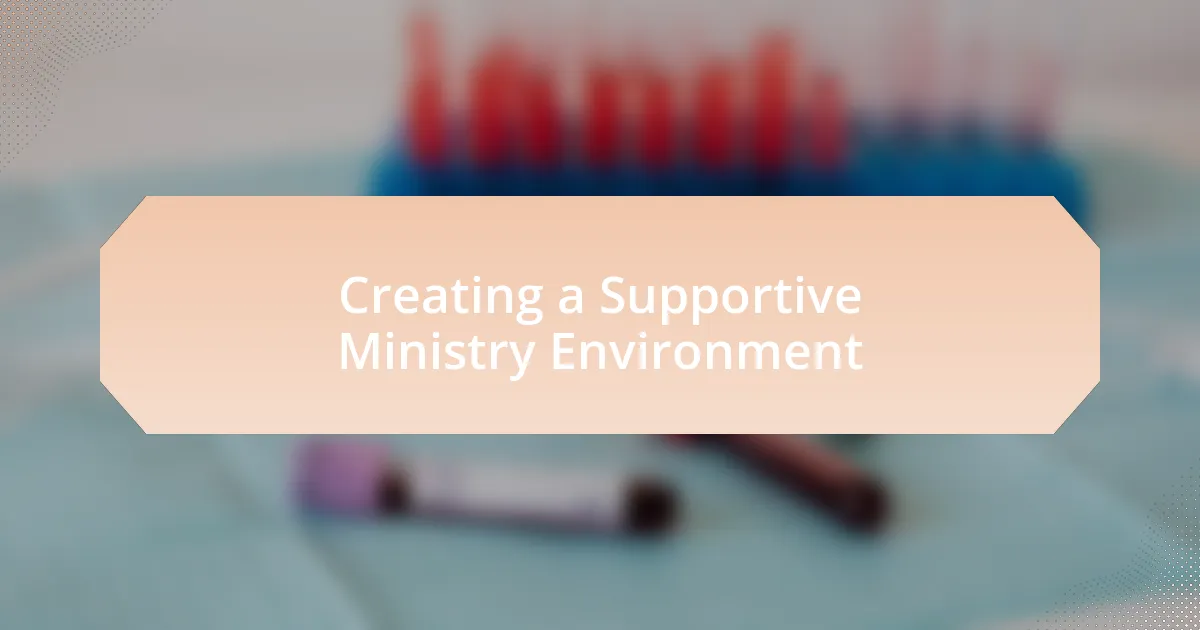Key takeaways:
- Burnout in ministry is a common issue caused by overextending oneself without adequate self-care, leading to emotional exhaustion and feelings of guilt.
- Recognizing and admitting burnout is essential for recovery, as it allows individuals to embrace vulnerability and establish healthier boundaries.
- Self-care, support from peers, and mindfulness practices are vital coping strategies that help restore balance and purpose in ministry work.
- Creating a supportive ministry environment involves open communication, celebrating efforts, and providing mental health resources to foster a sense of belonging and well-being.

Understanding Burnout in Ministry
Burnout in ministry is a subtle yet pervasive issue that affects many caregivers and leaders. I remember the tug in my chest when I realized I felt more exhausted after a service than uplifted. It’s a stark reminder that when we continuously pour ourselves out without adequate self-care, it becomes difficult to offer genuine support to those we serve.
This experience often stems from a disconnect between our idealism and the harsh realities of ministry life. Have you ever found yourself questioning why you still feel drained, even after a successful event? I have, and it took me time to understand that consistently overextending myself led to diminished enthusiasm and effectiveness in my role.
Moreover, there’s a profound emotional toll that can accompany burnout, often leading to feelings of guilt or isolation. I vividly recall a moment of questioning my calling: was I doing enough, or was my struggle a sign of weakness? Acknowledging these feelings is the first step toward healing, and it’s crucial to remember that you’re not alone in this journey.

My Personal Experience with Burnout
I’ll never forget the day I hit my breaking point. I sat in my office, overwhelmed by the demands on my time, and realized I hadn’t taken a proper break in weeks. That moment felt like both a revelation and a weight; I was physically present, but my spirit was drained and distant.
As I reflected on my feelings, I understood that ignoring my own needs wasn’t just detrimental to me—it ultimately affected everyone I was trying to help. I think back to the times I forced myself to push through exhaustion during visits, only to feel like a hollow version of myself. It made me question if I truly had the energy to impact others or if I was just going through the motions.
I often wondered why I was so reluctant to admit my burnout. Admitting it felt like admitting defeat in a space where strength and resilience are expected. Looking back, I realize that embracing vulnerability was a critical step toward recovery. Accepting my limits opened the door to healthier boundaries and a more sustainable approach to ministry.

Coping Strategies for Burnout Recovery
Taking time for self-care became an essential part of my burnout recovery. I remember the first time I allowed myself a full day off. It was a novel experience, initially filled with guilt, but as the hours unfolded, I felt an unexpected lightness. Engaging in activities that brought me joy—like hiking or reading—helped restore my spirit, reminding me that I am more than just my duties in ministry.
Another strategy that proved invaluable was connecting with others who understood my struggles. A close colleague and I formed a support group to share our experiences. I found immense comfort in these conversations, where I could voice my frustrations without judgment. Have you ever spoken your truth to someone who truly listens? It can be incredibly liberating and foster a sense of community that is often missing in ministry.
Mindfulness practices also played a pivotal role in my recovery journey. Incorporating simple techniques, like deep breathing and meditation, allowed me to regain clarity amidst the chaos. I vividly recall sitting quietly, focusing only on my breath. It was in those moments that I realized how often the noise of my responsibilities drowned out my own needs. This practice of tuning in has become a cornerstone in my life, helping me stay grounded and connected to my purpose.

Creating a Supportive Ministry Environment
Creating a supportive ministry environment starts with open lines of communication. I remember a time when our team sat down for a candid discussion about our workloads. The honesty in sharing struggles created an atmosphere of understanding, reminding us that we were all in this together. Who hasn’t felt isolated in their work? Dismantling that isolation is crucial for fostering a sense of belonging.
Another important aspect is recognizing and celebrating each other’s efforts. I initiated a monthly “appreciation day” where we acknowledged each other’s contributions, big and small. This simple practice transformed our dynamic; instead of feeling like we were just going through the motions, we began to appreciate the mission and each other more deeply. Don’t you think reflecting on our shared victories can rekindle our passion for ministry?
Lastly, providing resources for mental health support is vital. In my experience, when the church offered professional counseling sessions, it was a game changer. I remember the relief I felt knowing that help was just a call away. How often do we overlook these resources? Making them readily available signals to the ministry team that their well-being is a priority, paving the way for a nurturing environment where everyone can flourish.